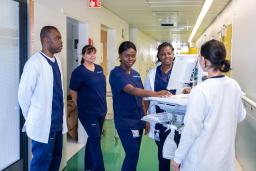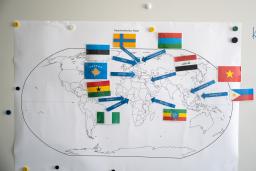Multiculturalism a strength for Pulmonary Disease Inpatient Ward
Keywords:International employees help to better address the needs of patients from different cultural backgrounds.

The Pulmonary Disease Inpatient Ward works as a team. Employees also learn about different cultures from one another. From left to right: Mawiya Abdul-Salam, Helen Raspel and Matilda Bonsu. Next to them are Registered Nurses Ama Fynn-Sackey and Jessica Conte.
The Pulmonary Disease Inpatient Ward at Jorvi Hospital treats patients with pneumonia, chronic obstructive pulmonary disease, asthma and lung cancer. The ward is a very international workplace, with over 12 foreign employees from ten different countries. The total number of nurses working with patients is 28.
"Multiculturalism is regarded as a valuable resource in our work community. Patients today come from many different cultures, so it also serves them for us to have nurses of different nationalities. At times, our nurses have been asked to help with interpretation at other HUS units, if no interpreter for the requested dialect has been found," says Nurse Manager Eeva-Liisa Ihander.
Eeva-Liisa describes the pulmonary disease unit as an open-minded and tolerant workplace. Over the last decade, a working culture has been established where everyone is valued and everyone's contribution is equally important. The workplace also has a common set of rules that are followed.
“It has been easy for new employees to come to work here. The collaboration between doctors and nurses is straightforward, and there is no hierarchy."
Cultural knowledge facilitates patient work
Registered Nurse Helen Raspel from Estonia has worked at Jorvi Pulmonary Disease Inpatient Ward for 13 years. Helen appreciates that employees are treated equal and they work as a team. Help is given to everyone who needs it, and it is always safe to ask questions.
"I've liked it here from the start. This is a great group of people, and I have been very well received. Maybe that's why I've stayed here for so long," Helen says.
Many of the foreign employees of the ward have completed their nursing education in Finland. One of them is Registered Nurse Mawiya Abdul-Salam from Ghana, who worked at Kauniala Hospital for three years before transferring to the Jorvi unit in order to strengthen his expertise of pulmonary diseases.
Mawiya believes that internationality benefits both the workplace and the patients. An employee familiar with the patient's culture can instruct other employees on what aspects should be considered in the patient’s care and why. For example, the patient may only want to be treated by a male or female nurse.
Mawiya recalls a patient with a severe coronavirus disease and a negative attitude towards treatment. Knowledge of the patient's language and culture was vital for the success of their treatment.
"When I came in to work, I was able to explain everything in the patient’s own language. They immediately started feeling positive about treatment, and everything turned out really well in the end," Mawiya recalls.
Sometimes, the situation can be the opposite. The patient or their family member may be surprised when first meeting a foreign nurse. But once the conversation gets going, so does the cooperation.
"I have quite a lot of experience of patients and family members seeing me and being a little suspicious, like, ‘okay, a foreign nurse’. But once I start communicating and they realise I know what I’m doing, all the suspicion flies out the window. They start cracking jokes and trusting me."

Individual employee orientation supports international nurses in their work
The Pulmonary Disease Inpatient Ward arranges individual orientation for all employees, and they are also supported by a Nursing Instructor. Ghanaian practical nursing student Matilda Bonsu considers employee orientation to be extremely important. Matilda is currently working part-time at the ward to gain more experience from the care industry.
"The school teaches us the theoretical aspects, but practical knowledge comes from working. I’ve liked it here. The atmosphere is good and the supervisors are nice, listening and providing opportunities for everyone."
HUS organises Finnish language courses for international employees, and the Heart and Lung Center also organises language workshops. Some of the staff have also independently acquired language training and developed their language skills. But Matilda says that language proficiency is best acquired from working life.
"There are always new things and new words to learn. The Finnish language evolves every day."